Top Ten U.S. Presidents with the Worst Foreign Policies
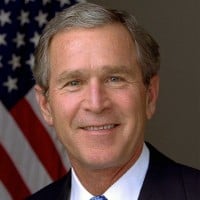 George Walker Bush is an American politician and businessman who was born in July 6, 1946. He served as the 43rd President of the United States from 2001 to 2009 and 46th Governor of Texas from 1995 to 2000. He is the eldest son of Barbara and George H. W.
George Walker Bush is an American politician and businessman who was born in July 6, 1946. He served as the 43rd President of the United States from 2001 to 2009 and 46th Governor of Texas from 1995 to 2000. He is the eldest son of Barbara and George H. W. Invaded Iraq and Afghanistan, opened Guantanamo Bay and tortured convicts that never had a trial, and expanded the power of the president by an extremely large margin.
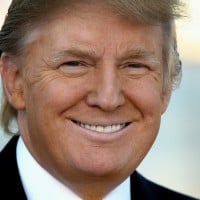 Donald John Trump (born June 14, 1946) is an American businessman, television personality, politician, and the 45th President of the United States. Born and raised in Queens, New York City, Donald J. Trump received an economics degree from the Wharton School of the University of Pennsylvania in 1968... read more
Donald John Trump (born June 14, 1946) is an American businessman, television personality, politician, and the 45th President of the United States. Born and raised in Queens, New York City, Donald J. Trump received an economics degree from the Wharton School of the University of Pennsylvania in 1968... read more While he hasn't been in office for a year yet, he's already piled up a disastrous reputation. He got the U.S. further involved in Syria after claiming the U.S. shouldn't be involved, he stepped up drone strikes which kill innocent civilians, he's supplied more aid to Saudi Arabia, and the lost, sadly, goes on.
He had the best 0 wars started in his presidency. Meaning trump didn't put America into any more pointless wars unlike Obama Bush Clinton and biden
Honestly this guys says some dumb stuff on Twitter but has amazing foreign policies. He managed to calm the tension with Korea, Russia, and China. When your president is friends with Putin, and Jung-Un, you know your in good hands
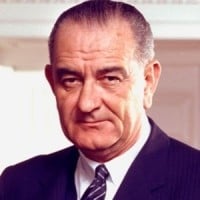 Lyndon Baines Johnson, often referred to as LBJ, was an American politician who served as the 36th President of the United States from 1963 to 1969.
Lyndon Baines Johnson, often referred to as LBJ, was an American politician who served as the 36th President of the United States from 1963 to 1969. During the Vietnam War, when he attempted to send hundreds of thousands more troops, his own party ran against him, causing him to drop out. Additionally, he promoted J. Edgar Hoover to report directly to him and retained him until Hoover's death. Hoover is widely regarded as one of the worst and longest-serving human rights violators in American history. It is perplexing how the same man who signed the 1964 Civil Rights Act, an initiative that originated with JFK and RFK (before JFK was assassinated in 1963), could elevate someone like Hoover, who appeared to oppose those principles. Hoover's name appeared on both his COINTELPRO list and an earlier custodial detention list, along with Eleanor Roosevelt, the author of the Universal Declaration of Human Rights, much to the dismay of FDR.
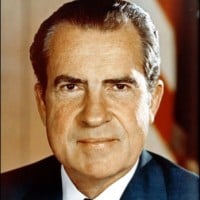 Richard Milhous Nixon was the 37th President of the United States from 1969 until his resignation in 1974, the only president to resign from office. He had previously served as the 36th Vice President of the United States from 1953 to 1961, and prior to that as a U.S. Representative and also Senator... read more
Richard Milhous Nixon was the 37th President of the United States from 1969 until his resignation in 1974, the only president to resign from office. He had previously served as the 36th Vice President of the United States from 1953 to 1961, and prior to that as a U.S. Representative and also Senator... read more He lied about wanting to end the Vietnam war in order to gain votes. He actually expanded it, and didn't pursue efforts to end it until it was clear that victory would be impossible without expanding U.S. forces even further, which would've been politically impossible. He also committed treason when he interfered in the initial peace talks during the Johnson administration in order to have a better chance of being elected.
 Ronald Wilson Reagan (1911-2004) was an American politician and actor who was 40th President of the United States from 1981 to 1989 . Prior to his presidency, he was the 33rd Governor of California from 1967 to 1975, following a career as a Hollywood actor and union leader until his death in 2004
Ronald Wilson Reagan (1911-2004) was an American politician and actor who was 40th President of the United States from 1981 to 1989 . Prior to his presidency, he was the 33rd Governor of California from 1967 to 1975, following a career as a Hollywood actor and union leader until his death in 2004 He supported violent dictatorships in Latin America, funded the contras, funded extremist groups in Afghanistan, etc.
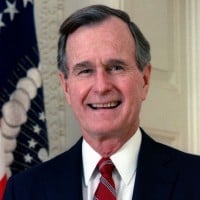 George Herbert Walker Bush (June 12, 1924 - November 30, 2018) was an American politician who served as the 41st President of the United States from 1989 to 1993. Prior to assuming the presidency, Bush served as the 43rd Vice President of the United States under Ronald Reagan from 1981 to 1989.
George Herbert Walker Bush (June 12, 1924 - November 30, 2018) was an American politician who served as the 41st President of the United States from 1989 to 1993. Prior to assuming the presidency, Bush served as the 43rd Vice President of the United States under Ronald Reagan from 1981 to 1989. He invaded Iraq, which began an unfortunate family tradition. He also aided the Reagan administration in supporting dictatorships in Latin America, many of which committed genocide against its own citizens.
 Barack Hussein Obama II (born August 4, 1961) is an American politician who served as the 44th president of the United States from 2009 to 2017. He was the first African-American president of the United States... read more
Barack Hussein Obama II (born August 4, 1961) is an American politician who served as the 44th president of the United States from 2009 to 2017. He was the first African-American president of the United States... read more He continued Bush's policies of unnecessary American intervention in the Middle East, which has killed thousands of innocent civilians. He also had U.S. civilians overseas assassinated without a trial because of a possible, but not definite, link to terrorism.
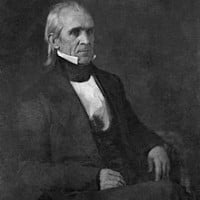 James Knox Polk was the 11th president of the United States, serving from 1845 to 1849. He previously was Speaker of the House of Representatives and governor of Tennessee.
James Knox Polk was the 11th president of the United States, serving from 1845 to 1849. He previously was Speaker of the House of Representatives and governor of Tennessee. Polk desperately wanted to expand the country's boarders, by force if necessary. Therefore, he agitated Mexico until the country attacked, and Polk threw his hands up and declared that the U.S. would invade Mexico in the name of self defense.
 Joseph Robinette Biden Jr. (born November 20, 1942) is an American politician who is the 46th and current president of the United States. A member of the Democratic Party, he served as the 47th vice president from 2009 to 2017 under Barack Obama and represented Delaware in the United States Senate from... read more
Joseph Robinette Biden Jr. (born November 20, 1942) is an American politician who is the 46th and current president of the United States. A member of the Democratic Party, he served as the 47th vice president from 2009 to 2017 under Barack Obama and represented Delaware in the United States Senate from... read more He was an absolute joke at the g7 summit leaders of Central America Guatemala and Honduras and Mexico all called out Biden on the border crisis which was 100% his fault.
I mean... did you see that summit he had? How about giving everything away to all these countries?
 James Buchanan, Jr. was the 15th President of the United States, serving immediately prior to the American Civil War.
James Buchanan, Jr. was the 15th President of the United States, serving immediately prior to the American Civil War.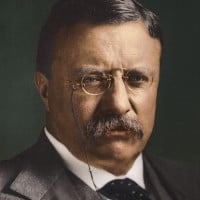 Theodore Roosevelt was an American statesman, author, explorer, soldier, naturalist, and reformer who served as the 26th President of the United States from 1901 to 1909. As a leader of the Republican Party during this time, he became a driving force for the Progressive Era in the United States in the... read more
Theodore Roosevelt was an American statesman, author, explorer, soldier, naturalist, and reformer who served as the 26th President of the United States from 1901 to 1909. As a leader of the Republican Party during this time, he became a driving force for the Progressive Era in the United States in the... read more Like LBJ, he had a masterful domestic policy, but Teddy was a warmonger. He once wrote, "I should welcome almost any war, for I think this country needs one." Nothing spells patriotism and love for one's country than going to war over trivial things in order to boost soldiers' morale. Night at the Museum will never be the same again.
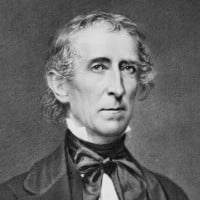 John Tyler was the tenth President of the United States. He was also, briefly, the tenth Vice President, elected to that office on the 1840 Whig ticket with William Henry Harrison.
John Tyler was the tenth President of the United States. He was also, briefly, the tenth Vice President, elected to that office on the 1840 Whig ticket with William Henry Harrison.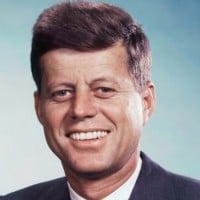 John Fitzgerald Kennedy (May 29th, 1917 - November 22, 1963) commonly referred to by his initials JFK, was an American politician who served as the 35th President of the United States from January 1961 until his assassination. The Cuban Missile Crisis, The Bay of Pigs Invasion, the Nuclear Test Ban... read more
John Fitzgerald Kennedy (May 29th, 1917 - November 22, 1963) commonly referred to by his initials JFK, was an American politician who served as the 35th President of the United States from January 1961 until his assassination. The Cuban Missile Crisis, The Bay of Pigs Invasion, the Nuclear Test Ban... read more Again, your knowledge is lacking. Communism is not "a form of anarchy." Anarchists are simply useful idiots, used to set the stage for communist revolution, and routinely eliminated afterword. EVERY communist regime - Lenin, Stalin, Mao, Pol Pot, Ho Chi Minh, East Germany, Fidel, the North Korean "Kim" dynasty, et al - has been a brutal dictatorship of either one or a handful. Hitler was a fascistic Marxist nationalist. As to Cuba: Are you not familiar with the Monroe Doctrine? It was long ago expanded to address the threat of communism in America's geopolitical neighborhood. It's sane policy.
 Thomas Woodrow Wilson was an American politician and academic who served as the 28th President of the United States from 1913 to 1921. Born in Staunton, Virginia, he spent his early years in Augusta, Georgia and Columbia, South Carolina.
Thomas Woodrow Wilson was an American politician and academic who served as the 28th President of the United States from 1913 to 1921. Born in Staunton, Virginia, he spent his early years in Augusta, Georgia and Columbia, South Carolina.
 James Earl "Jimmy" Carter, Jr. (born October 1, 1924) is an American politician and author who served as the 39th President of the United States from 1977 to 1981. In 2002, he was awarded the Nobel Peace Prize for his work with the Carter Center.
James Earl "Jimmy" Carter, Jr. (born October 1, 1924) is an American politician and author who served as the 39th President of the United States from 1977 to 1981. In 2002, he was awarded the Nobel Peace Prize for his work with the Carter Center. John Adams was born on October 30, 1735 in Quincy, Massachusetts, United States. Adams served as the president of the United States from March 4, 1797 to March 4, 1801. He died on July 4, 1826 at the age of 90.
John Adams was born on October 30, 1735 in Quincy, Massachusetts, United States. Adams served as the president of the United States from March 4, 1797 to March 4, 1801. He died on July 4, 1826 at the age of 90. William Henry Harrison was an American statesman who served as the 9th President of the United States from March 4, 1841 until his death on April 4, 1841. The cause of death of William Henry Harrison was pneumonia, after a cold and wet inauguration.
William Henry Harrison was an American statesman who served as the 9th President of the United States from March 4, 1841 until his death on April 4, 1841. The cause of death of William Henry Harrison was pneumonia, after a cold and wet inauguration. Abraham Lincoln (February 12, 1809 – April 15, 1865) was an American lawyer and statesman who served as the 16th president of the United States from 1861 until his assassination in 1865. Lincoln led the nation through the American Civil War and succeeded in preserving the Union, abolishing slavery,... read more
Abraham Lincoln (February 12, 1809 – April 15, 1865) was an American lawyer and statesman who served as the 16th president of the United States from 1861 until his assassination in 1865. Lincoln led the nation through the American Civil War and succeeded in preserving the Union, abolishing slavery,... read more Harry S. Truman was the 33rd President of the United States, an American politician of the Democratic Party.
Harry S. Truman was the 33rd President of the United States, an American politician of the Democratic Party.